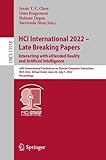HCI International 2022 – Late Breaking Papers: Interacting with eXtended Reality and Artificial Intelligence [electronic resource] : 24th International Conference on Human-Computer Interaction, HCII 2022, Virtual Event, June 26 – July 1, 2022, Proceedings /
Material type: TextSeries: Lecture Notes in Computer Science ; 13518Publisher: Cham : Springer Nature Switzerland : Imprint: Springer, 2022Edition: 1st ed. 2022Description: XXI, 616 p. 208 illus., 174 illus. in color. online resourceContent type:
TextSeries: Lecture Notes in Computer Science ; 13518Publisher: Cham : Springer Nature Switzerland : Imprint: Springer, 2022Edition: 1st ed. 2022Description: XXI, 616 p. 208 illus., 174 illus. in color. online resourceContent type: - text
- computer
- online resource
- 9783031217074
- User interfaces (Computer systems)
- Human-computer interaction
- Application software
- Artificial intelligence
- Database management
- Computer vision
- Electronic commerce
- User Interfaces and Human Computer Interaction
- Computer and Information Systems Applications
- Artificial Intelligence
- Database Management
- Computer Vision
- e-Commerce and e-Business
- 005.437 23
- 004.019 23
- QA76.9.U83
- QA76.9.H85
User Experience in eXtended Reality -- Youkai: a Cross-platform Framework for Testing VR/AR Apps -- Storyboards in VR Narratives Planning: How to Create and Evaluate Them -- A Study on the Analysis of Visual User Experience in HMD-Based Virtual Environments -- A Study on the Analysis of Visual User Experience in HMD-Based Virtual Environments -- Proposal for a User-Centered Virtual Reality System for Promoting Tourism in Peru -- Integrating Sensor Fusion with Pose Estimation for Simulating Human Interactions in Virtual Reality -- Development of a Surgical Image Object Display System Using AR Device and Evaluation of its Depth Perception -- The Practical Research of Mixed Reality for Photographic Darkroom Education -- Enabling Human Interaction in Virtual Reality: An Explorative Overview of Opportunities and Limitations of Current VR Technology -- Effects of Skin-to-Skin Interaction Through Avatars on Users in a VR Environment ― Assessment by Autonomic Nervous System Activity Index― -- The Possibility of Inducing the Proteus Effect for Social VR Users -- Virtual Reality to Support Healthcare Workers in Managing Stress and Anxiety During the COVID-19 Pandemic: An Online Survey -- Effects of Virtual Space in Soccer Tactical Instruction -- A Real Space Extension Approach Using a Turntable for Natural Walking in Virtual Reality -- Extending Smartphone-Based Hand Gesture Recognition for Augmented Reality Applications With Two-Finger-Pinch and Thumb-Orientation Gestures -- Metaverse and Human-Computer Interaction: A Technology Framework for 3D Virtual Worlds -- Metaverse and Human-Computer Interaction: A Technology Framework for 3D Virtual Worlds -- Artificial Intelligence in Human-Computer Interaction -- Explainable and High-Performance Hate and Offensive Speech Detection -- Improving Labeling Through Social Science Insights: Preliminary Results and Research Agenda -- Howto Explain it to Energy Engineers – A Qualitative User Study About Trustworthiness, Understandability, and Actionability -- I'm Only Human: The Effects of Trust Dampening by Anthropomorphic Agents -- I'm Only Human: The Effects of Trust Dampening by Anthropomorphic Agents -- Understanding the Nature and Constituent Elements of Artificial Intelligence-Based Applications: a Scoping Review Research in Progress -- What Are The Factors That Drive AI Acceptance: A Meta-Analysis Approach -- How can No/Low Code platforms Help End-users Develop ML Applications? - A systematic review -- ConfLabeling: Assisting Image Labeling with User and System Confidence -- Conversations Towards Practiced AI -HCI Heuristics -- AI-based Coaching: Impact of a Chatbot’s Disclosure Behavior on the Working Alliance and Acceptance -- A Unified Framework to Collect and Document AI-Infused Project Exemplars -- Hey ASR System! Why Aren’t You More Inclusive? Automatic Speech Recognition Systems’ Bias and Proposed Bias Mitigation Techniques - A Literature Review -- Transferring AI Explainability to User-centered Explanations of Complex COVID-19 Information -- Responsible Artificial Intelligence in Knowledge Work: User Experience Design Problems and Implications -- Human-Centered Artificial Intelligence: Beyond a Two-Dimensional Framework -- Human-Centred AI in the Age of Industry 5.0: A Systematic Review Protocol -- Applying the Design Sprint to Interactive Machine Learning Experience Design: a Case Study from Aveni -- A Comparative Study of BERT-based Attention Flows versus Human Attentions on Fill-in-blank Task -- Book Recommender System Using CNN Capturing Feature of Synopses and Reviews -- Discover Manaus: The Challenges of Developing a System with Artificial Intelligence Aimed at the End User, a Case Study -- Exploring the Role of Trust during Human-AI Collaboration in Managerial Decision-Making Processes -- Legal andRegulatory Issues on Artificial Intelligence, Machine Learning, Data Science, and Big Data -- Responsible Human-Centered Artificial Intelligence for the Cognitive Enhancement of Knowledge Workers -- Responsible Human-Centered Artificial Intelligence for the Cognitive Enhancement of Knowledge Workers -- Ransomware Attack Detection on the Internet of Things Using Machine Learning Algorithm.
This proceedings LNCS 13518 constitutes the refereed proceedings of the 24th International Conference on Human-Computer Interaction, HCII 2022, which was held virtually as part of the 24th International Conference, HCII 2022, in June/July 2022. HCII 2022 received a total of 5583 submissions from academia, research institutes, industry, and governmental agencies from 88 countries submitted contributions, and 1276 papers and 275 posters were included in the proceedings that were published just before the start of the conference. Additionally, 296 papers and 181 posters are included in the volumes of the proceedings published after the conference, as “Late Breaking Work” (papers and posters). The contributions thoroughly cover the entire field of human-computer interaction, addressing major advances in knowledge and effective use of computers in a variety of application areas.


There are no comments on this title.